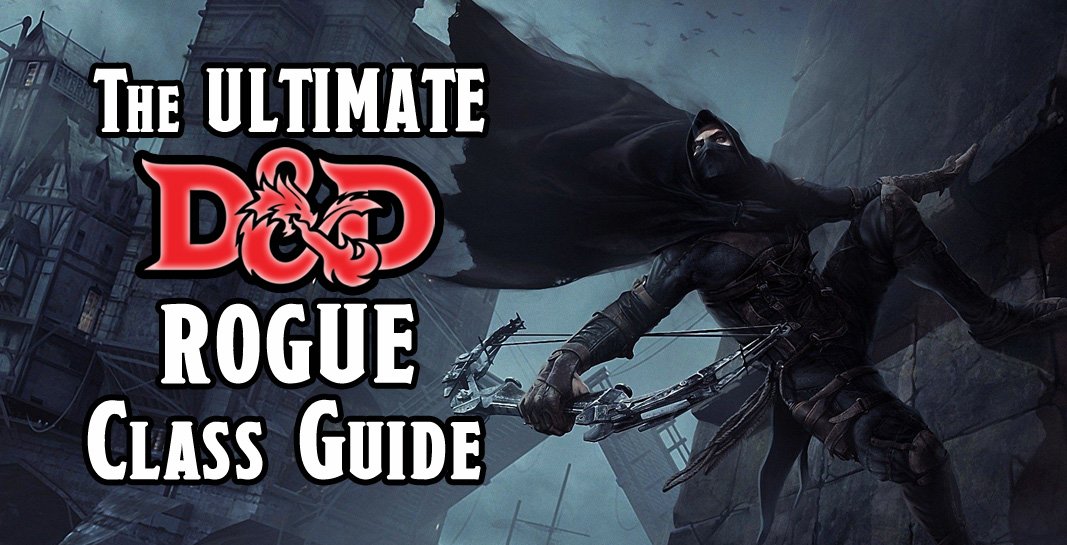
Rogues are the unseen hand, the masked face, and the subtle knife. They excel at deceit, stealth, and backstabbing. Rogue is a fun class to play, which affords you several important party roles. You are the investigator, trap springer, recon specialist, sniper, and tag-team attacker. With the skills and reliable talent features, Rogues can muddle their way through almost any skill challenge.
Follow this guide to discover how to best optimize the skills, weapons, features, and abilities for a D&D 5e Rogue class character build. While the options presented here may be the optimal build for a rogue (in my opinion), the beauty of D&D character creation is that the only limit is your imagination so feel free to build your character whichever way you want to.
The guide that follows uses a color-coding system to rank the abilities granted.
Blue = An essential, class-defining ability you would be remiss to overlook.
Green = A strong choice for your class.
Orange = Average option, useful in specific circumstances
Red = Below average, extremely situational, or otherwise just bad.
All features and abilities are from the core rulebook set (Player’s Handbook, Monster Manual, and Dungeon Master’s Guide) unless otherwise attributed.
Party Role
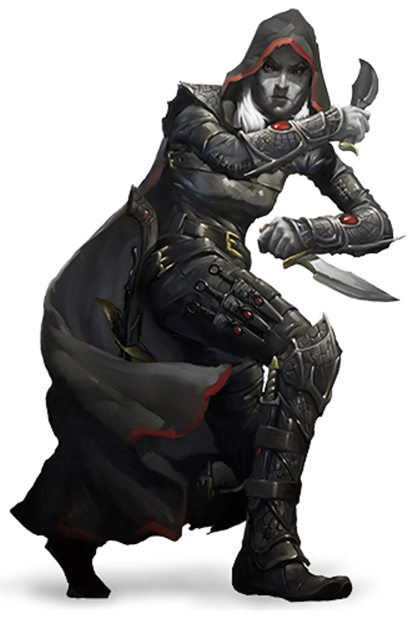
In addition to a boatload of skills and useful adventuring abilities, Rogues are the ultimate team players in combat situations. Rogues have the ability to scout well, investigate and spring traps, and to support primary damage dealers in combat with decisive blows to already weakened opponents.
Strengths:
- Rogues have a huge degree of customization, with a deep skills list, interesting class features, and great armor and weapon proficiencies that pair well with their natural strengths.
- Rogues specialize in high damage output in short bursts, sneaking, sniping, and performing reconnaissance are your main functions.
- Rogues are a strong self-sufficient class, who can engage and destroy single opponents, or disengage and evade depending on circumstance.
Weaknesses:
- Few options for fighting multiple opponents, almost no options to make multiple attacks per turn.
- Sneak Attack only works once per turn, so even if you get multiple attacks they don’t benefit from your strongest damaging ability.
- After level 8 Rogue becomes uninteresting, having gained all their strongest abilities already. This does make a good place to cross-class, however.
Check out this video by Don’t Stop Thinking which summarizes the D&D Rogue Class:
Ability Scores
Strength: You don’t need to use Strength or strength-based skills
Dexterity: Your most important stat. All your attacks, skills, and class abilities will require dexterity-based rolls.
Constitution: If you’re going to be fighting in melee you need a decent Constitution to provide you with enough Hit Points to have some staying power.
Intelligence: Very important for Arcane Trickster casting, and useful for all the skills associated with it otherwise.
Wisdom: You need high perception, but otherwise this isn’t too important.
Charisma: Rogues make a great party spokesperson. Proficiency in both Persuasion and Deception makes a compelling negotiator.
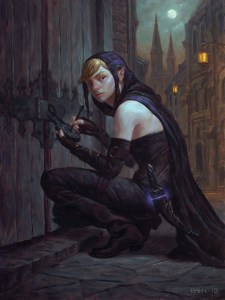
Locks are a challenge, not a barrier.
Races
Greyhawk and Forgotten Realms Races
AarakocraEEPC: An amazing race for ranged combat rogues. Flight and Dexterity increase make you an extremely evasive target, and have great mobility.
AasimarVGtM: Aasimar are more geared towards casters.
Fallen: Nothing useful for Rogues.
Protector: Nothing useful for Rogues.
Scourge: Nothing useful for Rogues.
BugbearVGtM: The Strength increase is lost on a Rogue. Stealth proficiency and reach on melee weapons make a great addition you your skillset, since rogues aren’t proficient with reach weapons normally. Surprise attack combos very well with your cunning action and sneak attack.
DhampirVRGtR: The built-in spider climb alone makes this worth taking. Setting up a flanking maneuver from any direction nearly ensures sneak attack. Gaining advantage on your bite attack while at less than half hit points guarantees you a sneak attack when you’re in dire straights.
Dragonborn: Nothing useful for Rogues.
Dwarf:
Hill Dwarf: The extra hit points help, and the Wisdom increase helps with your Perception.
Mountain Dwarf: Nothing useful for Rogues.
DuergarSCAG: The racial spells are interesting, but the ability spread is less than ideal.

The dexterity increase and Darkvision that Elves posses play to a Rogue’s strengths
Elf: Dexterity increase and Darkvision play to your strengths.
Drow: the increased Darkvision radius is great, but as always, Sunlight Sensitivity is a huge drawback.
EladrinMToF: Fey Step puts you in position to use Sneak Attack.
High Elf: The Intelligence boost makes for a powerful Arcane Trickster.
Sea ElfMToF: Good in an aquatic campaign.
Shadar-KaiMToF: Another teleportation ability, great for setting up sneak attacks.
Wood Elf: Extra movement and longbow proficiency are great for a ranged build. Mask of the Wild grants you extra leeway for using your cunning action to Hide.
FairyTWBtW: Flight and free spells make this an incredibly powerful race.
FirbolgVGtM: Nothing useful for Rogues.
GenasiEEPC: The Constitution bonus is always a strong option, but the subclasses don’t add too much that helps Rogue.
Air: Dexterity bonus, but nothing else useful.
Earth: Strength is wasted on a rogue, but the mobility is useful given your need for good positioning.
Fire: Only a good choice for an Arcane Trickster. Burning hands is a strong damage-dealing spell outside the scope of spells for Arcane Trickster.
Water: Nothing useful for Rogues.
GithMToF: Nothing useful for Rogues.
Githyanki: Nothing useful for Rogues.
Githzerai: Nothing useful for Rogues.
Gnome: Gnomes make strong Rogues, specifically the Deep Gnome.
Deep (Svirfneblin)EEPC/SCAG: This subrace makes great Rogues, especially in subterranean settings with their Dexterity increase, and advantage on Stealth checks to hide among stone.
Forest: Dexterity and Intelligence for boosting Arcane Trickster usefulness.
Rock: The Constitution bonus is nice, but otherwise not synergistic with Rogues.
GoblinVGtM: The Goblin’s mobility options overlap with cunning action, but otherwise, a great choice.
GoliathVGtM/EEPC: Goliaths are Strength-based, Rogues are Dexterity-based. Poor synergy.
Half-Elf: Darkvision, two free skills, and your choice of ability buffs. Applying a subrace is an interesting twist. Standard is strongest, but the others afford some unique choices.
Standard: Proficiency in many skills makes the Rogue the most useful party member both in and out of combat.
AquaticSACG: Only useful in an aquatic campaign.
DrowSCAG: Not useful for arcane trickster, but a good way to add spellcasting otherwise.
Moon/SunSCAG: Access to a cantrip grants you extra damage in the form of green flame blade or booming blade.
WoodSCAG: Two skills are generally more useful than the extra movement and hide bonus.
Half-Orc: Poor ability spread for Rogue. The other abilities are tempting, but contrary to your general strategy.
Halfling: The Dexterity increase and Luck both amplify your effectiveness.
Lightfoot: Being able to hide behind a party member keeps you out of harm’s way.
GhostwiseSCAG: Interesting, but not as good as other options.
Stout: This subrace is the most durable, great for a melee Rogue.
HarengonTWBtW: There’s too much overlap on function to make this worthwhile.
HexbloodVRGtR: The magic granted by this race is useful for an Arcane trickster, but not so much for other Rogue builds.
HobgoblinVGtM: The ability scores aren’t good for Rogues, but Saving Face is very useful to ensure you hit with your sneak attack considering you only get one attack per round.
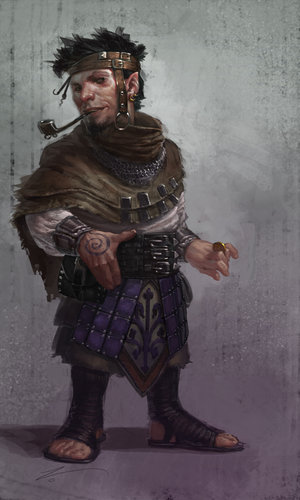
The small stature of Halflings give them various advantages as a Rogue
Human: All-around strong race for any class.
Standard: Great for rounding out odd ability scores from a point-buy character creation.
Variant: increasing your Dexterity, a bonus skill, and picking up a feat at first level grants you a huge advantage. Skilled makes you useful in any situation right off the bat with a total of 10 proficient skills at level 1.
KenkuVGtM: Solid ability score increases, and access to two skills. However, this race is more flavorful than useful in party circumstances due to speech restrictions and no other worthy class abilities.
KoboldVGtM: Pack tactics doesn’t give you any extra utility for sneak attack. Sunlight sensitivity is a tough hurdle to overcome, and severely hampers your sneak attack opportunities. The Strength penalty means nothing to you, as that is the Rogue’s typical dump stat.
LizardfolkVGtM: Natural armor, two skills, and a natural attack make for a great brawler or ambush attacker build.
OrcVGtM: Poo ability spread for Rogues.
RebornVRGtR: In most cases, this race would be mediocre. In the case of a skill-forward class like Rogue, the Knowledge from a Past Life ability will come in very useful.
TabaxiVGtM: This race was built for Rogue. Dexterity, relevant skills, darkvision, mobility and a natural attack to boot.
Tiefling: Tieflings make compelling Rogues. Darkvision, spellcasting, energy resistance, and the Charisma to play the Party Leader.
Standard: The Standard Tiefling package has a solid suite of abilities for a Rogue.
Devil’s TongueSCAG: A great choice for Mastermind and Inquisitive Rogues.
FeralSCAG: Perfect stat spread for Arcane Trickster.
HellfireSCAG: Burning hands isn’t eligible for Sneak Attack. Hellish rebuke is a reaction.
WingedSCAG: Flight in place of the spellcasting grants you more relevant mobility over arcane utility.
AsmodeusMToF: The ability score increases aren’t as good as Feral or Glasya, but the Charisma is welcomed if you’re trying to be the party leader.
BaalzebulMToF: Bad ability spread.
DispaterMToF: Greate for an Inquisitive or Mastermind Rogue.
FiernaMToF: Bad ability spread.
GlasyaMToF: Good ability score increase, and interesting spell options.
LevistusMToF: Bad ability spread.
MammonMToF: Bad ability spread.
MephistophlesMToF: Bad ability spread.
ZarielMToF: Bad ability spread.
TortleXGE/TP: Not very strong for Rogue.
TritonVGtM: Nothing useful for Rogue.
Yuan-Ti PurebloodVGtM: nothing useful for Rogue.
Eberron Races
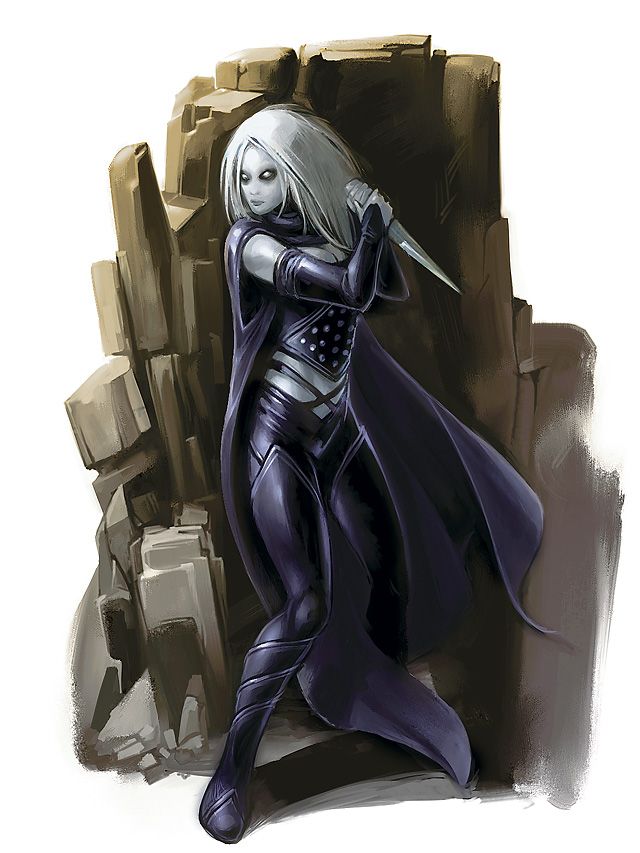
“Shapeshifting abilities make Changelings natural rogues”
ChangelingERLW: The ability score increase and shapeshifting ability make Changelings natural rogues.
KalashtarERLW: Poor ability spread for Rogues.
OrcERLW: Poor ability spread for Rogues.
ShifterERLW: Darkvision is a boon, but the subraces conflict or overlap with the class abilities of Rogues.
Beasthide: Bad ability spread.
Longtooth: Bad ability spread.
Swiftstride: Good ability score increases, but the shifting features overlap with Cunning Action.
Wildhunt: Shifting features are useless.
WarforgedERLW: The flexible ability scores work well in your favor. Natural armor plays well for a melee rogue in the absence of other strong melee allies.
Strixhaven Races
OwlinSACoC: Stealth, flight, and darkvision make you a silent predator and the perfect sneak thief.
Ravnica Races
CentaurGGTR: Nothing useful for Rogue.
LoxodonGGTR: Nothing useful for Rogue.
MinotaurGGTR: Nothing useful for Rogue.
Simic HybridGGTR: Versatile abilities and racial bonuses allow you to optimize your Rogue build.
VedalkenGGTR: The ability score increases aren’t ideal for any build other than Arcane Trickster, but Tireless Precision works very well to ensure you hit your mark with skills and tools.
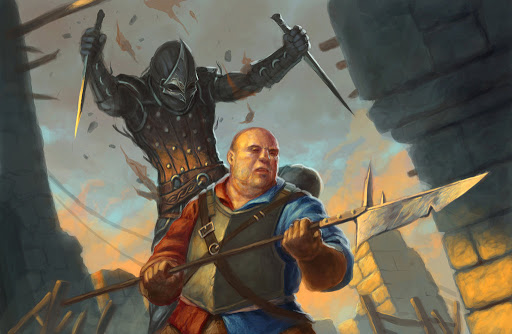
Class Features
Hit Dice: d8 Hit Dice is risky for melee combatants, but if you have a good support crew or take a ranged build you should be ok.
Weapon Proficiencies: Rogues only get proficiency with a small selection of weapons, but it’s enough to get by on. Sneak Attack makes up a bulk of the potential damage they can do, and weapon type becomes less important as your sneak attack dice pool increases.
Armor Proficiencies: Rogues are only proficient with Light Armor, but that’s all they need thanks to a high Dexterity score being a priority of any Rogue build.
Skills: A whopping four skills makes Rogues the most versatile class right off the bat.
Tool Proficiencies: Thieves’ tools are your bread and butter. Choose a background that grants use of a disguise kit, and you’re
Saving Throws: Dexterity saves coupled with your other defensive abilities make you resistant to many powerful opponents’ attacks. Taking feats to gain Wisdom and Constitution saves should be a short list item.
Expertise: Double proficiency on your most used skills makes you quite reliable when it really matters.
Sneak Attack: The defining feature of your class. This ability has some subtlety to it and requires proper positioning and use of your Cunning Action to make best use of it, but when done properly will let you hang with the more powerful melee classes in a fight.
Thieves’ Cant: Highly situational. Useful in a party with more than one Rogue to communicate secretly.
Cunning Action: The second reason to play a Rogue. You will always have use of your bonus action.
Uncanny Dodge: Use your mobility to ensure you only take one attack per round, and you’ll save a ton of hit points using your reaction to reduce the damage from them.
Evasion: Dragon breath doesn’t scare you as much as other players.
Reliable Talent: Incentive to take the Skilled feat, this almost guarantees you will pass any skill check you are required to make.
Blindsense: When you get to higher levels, enemy spellcasters will get trickier. This ensures you can find and dispatch them.
Slippery Mind: Too little too late, but useful none the less.
Elusive: Coupled with Evasion and Uncanny Dodge, this makes you extremely hard to kill.
Stroke of Luck: An incredible capstone, this grants you a free shot against anyone you get the drop on.
Roguish Archetypes
Arcane Trickster
The only way Rogues have access to magic is through the Arcane Trickster Roguish Archetype. This subclass affords you spellcasting and several abilities that enhance it. For the already versatile Rogue, this archetype grants you even more range in what you are capable of.
Spellcasting: You are restricted to illusion and enchantment spells with few exceptions. This suffices for the Rogue, as those schools of magic play directly into your strengths and amplify your effectiveness. Keep in mind that Sneak Attack can apply to only Dexterity-based weapon attacks and does not apply to spells.
Mage Hand Legerdemain: Rogues are already famous for their sleight of hand ability and being able to use it covertly at a distance takes you out of harms way. This ability comes in handy outside of combat allowing you to covertly act without drawing attention to yourself. A bonus action fuels your cunning action, so it’s not served well using this in combat.
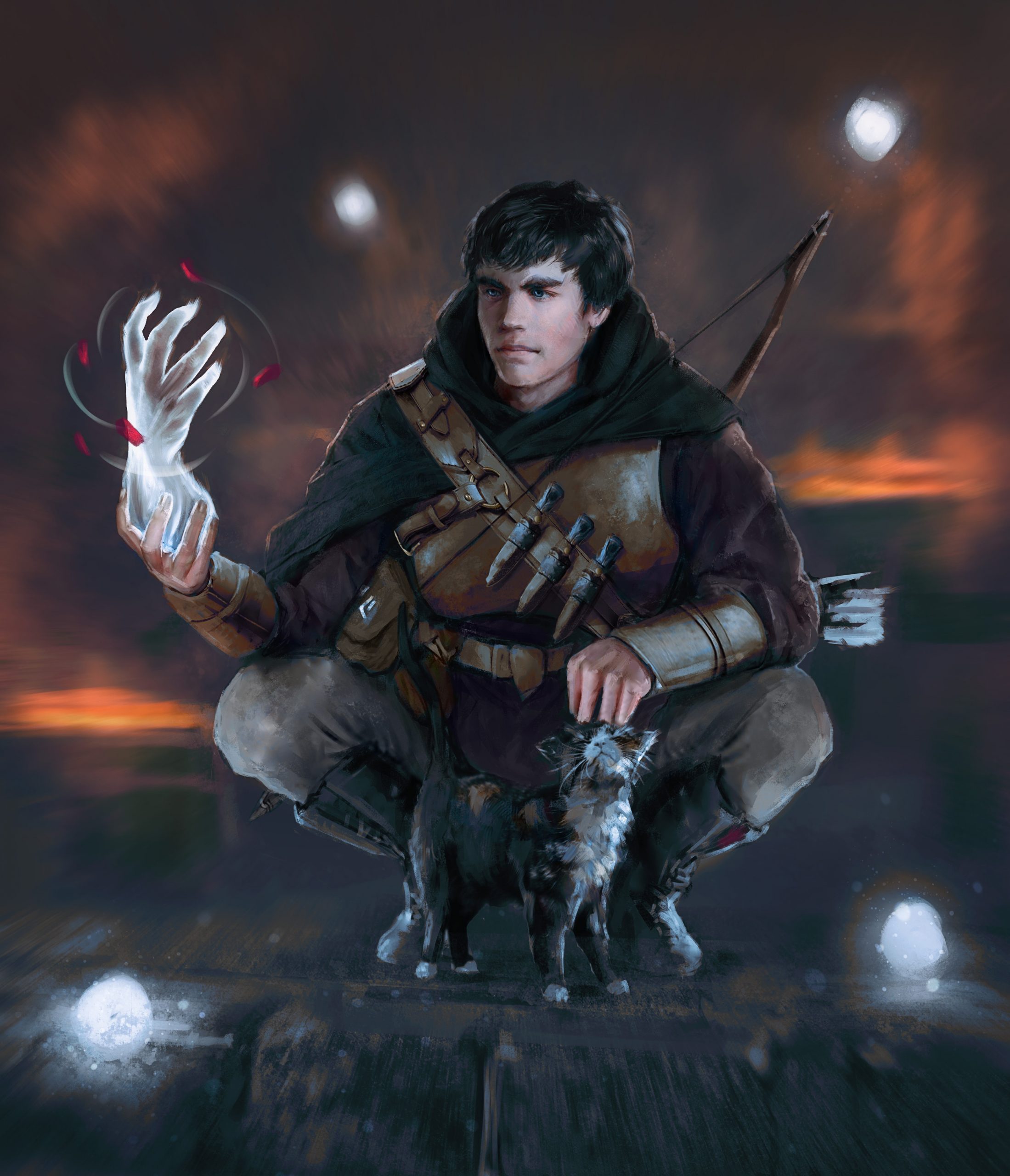
Magical Ambush: You’re likely going to have a lower than optimal Intelligence compared to a primary caster, so this allows you to rely on statistics rather than power in order to make your spells land.
Versatile Trickster: Using your bonus action to gain advantage on an attack allows you to get your sneak attack in more reliably each round without relying on help from others.
Spell Thief: This ability is best served copying spells from enemy spellcasters. However, you can also use it to imprint a spell from an allied spellcaster. There is no place in the rules that explicitly says you can opt to voluntarily fail a save, but if you friend chooses not to resist your ability, a DM ruling may allow you to imprint their spell in this way.
Assassin
To walk the path of the assassin is to dedicate yourself to infiltration and assassination. Your skillset allows you to go anywhere and kill anyone without leaving a trace or arousing suspicion. Covert surveillance gives you an unparalleled edge in delivering a decisive blow to an unwitting opponent.
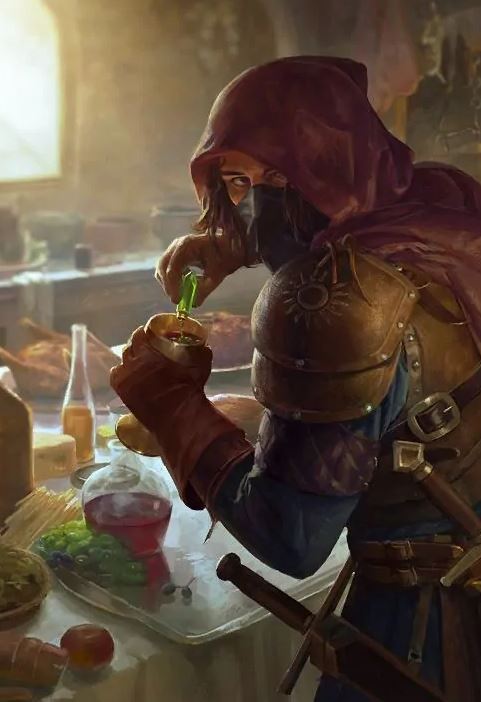
Bonus Proficiencies: Disguise and poison are two powerful tools you can use to search and destroy.
Assassinate: With a naturally high Dexterity, and especially if you spring for the Alert feat, you’re pretty much guaranteed to have super-advantage against anyone you attack in the first round of combat.
Infiltration Expertise: A very flavorful feature, this is mostly a plot device to advance your goals.
Imposter: The bonus to Deception is welcome, but this is very similar to Infiltration Expertise and is mostly for flavor.
Death Strike: Combined with Sneak Attack and Assassinate, anyone you catch unawares is in for a world of hurt if you connect.
InquisitiveXGtE
For an urban campaign full of intrigue, the Inquisitive Rogue makes a great detective. All your abilities revolve around detecting clues, evidence, and intentions. The Inquisitive really shines when used in a role-play heavy campaign, where skill checks are more important than damage output in combat. This Archetype has fewer combat options than others available to the Rogue. This Archetype is heavily Wisdom-dependent.
Ear for Deceit: This is more useful in combination with Insightful Fighting than on its own. If you’re proficient, your reliable talent will cover you here. This is useful at low levels, but will diminish once you reach this crucial Rogue milestone
Eye for Detail: Useful for use during combat, but other Roguish Archetypes have better add-ons to cunning action.
Insightful Fighting: Ear for Deceit makes this more reliable. An attempt to gain sneak attack in exchange for your bonus action is helpful, but it’s not as reliable as a sure-fire way to get sneak attack like battlefield positioning provided by an ally or stealth. An opposed check brings two variables into the mix, where other methods only have only one, or none at all.
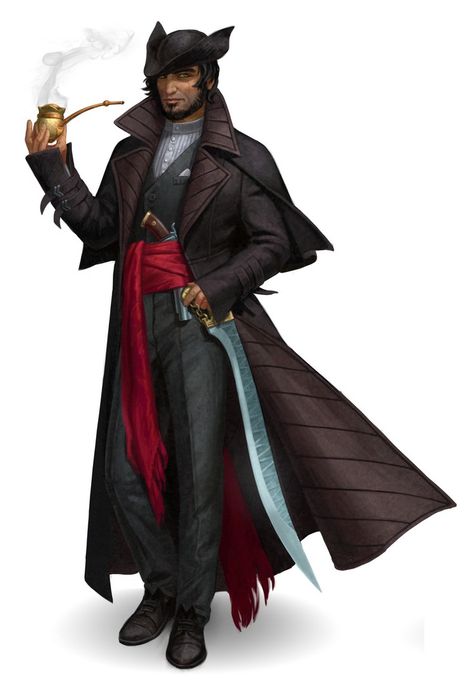
Steady Eye: This grants you an extra advantage searching for traps so long as you aren’t in a hurry.
Unerring Eye: The ability to see through almost any deception a certain number of times per day will make you a great sleuth against supernatural perpetrators.
Eye for Weakness: The only relevant combat ability of this class comes at the end and relies on successful activation of another class ability that depends on two dice rolls. Compared to other Roguish Archetype damage increase abilities, this is wholly underwhelming.
MastermindXGtE
This Archetype a similar and decidedly more evil opposite to the Inquisitive. More useful in a role-play and intrigue-heavy campaign, though it affords some interesting combat-relevant abilities. The Mastermind specializes in tactics and manipulation.
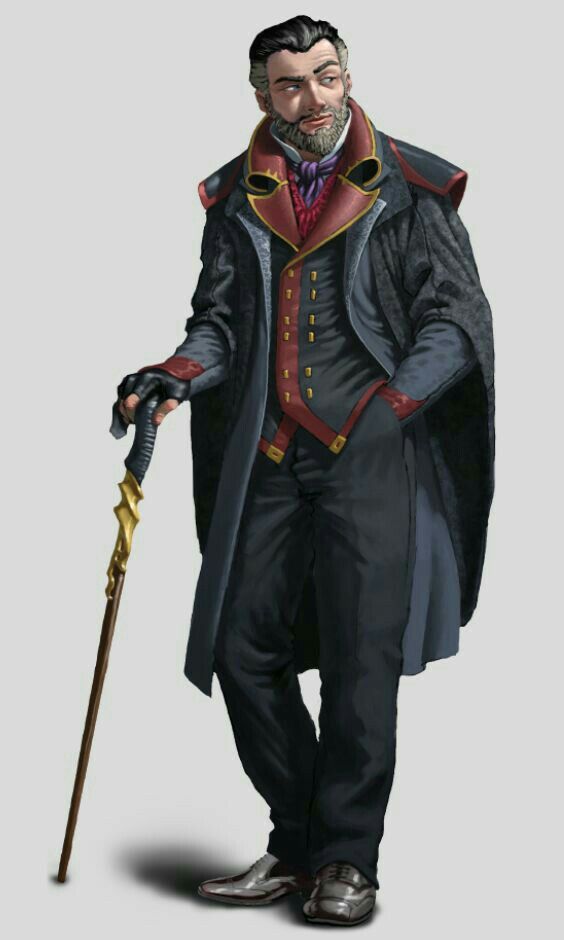
Master of Intrigue: Proficiencies with several tools and languages gives you a more distinct flair, but aren’t terribly relevant
Master of Tactics: Granting advantage to another character as a bonus action is a useful addition to your cunning action. The additional range gives a party with multiple rogues a reliable avenue to gain sneak attack.
Insightful Manipulator: A little metagame-y, but useful none the less.
Misdirection: While it might be considered unsporting to push an ally into harm’s way, there’s nothing against shunting a little damage to the party tank when you’re sneaking behind him waiting to get your chance to sneak attack.
Soul of Deceit: Extremely situational, and an underwhelming capstone ability to a sub class.
PhantomTCoE
The Goth Rogue, Phantoms are experts at causing death. They have a series of abilities that when stacked, make them great at fighting swarms of enemies, albeit slowly, given the Rogue’s single allowable attack per round. That’s the only true limitation on this subclass. If you cross class and get an extra attack or two-weapon fighting style, you’re going to be an absolute powerhouse.
Whispers of the Dead: flexible proficiencies mean with your already impressive selection of skills you can tailor them to the job.
Wails from the Grave: While it isn’t a lot of damage, it makes up for your only having one attack per round. It scales really well, and by the time you get to level 16 it’s going to be putting out a ton of damage each day.
Tokens of the Departed: This ability has so many amazing uses. It allows you to continue to use your wails of the grave ability against a whole army of minions that would die in one hit to your sneak attack.
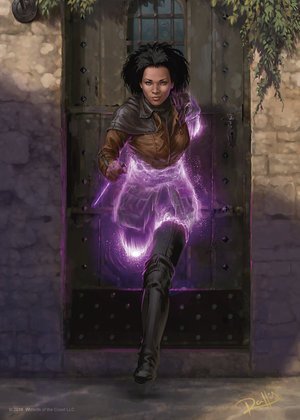
Ghost Walk: An amazing infiltration ability, allowing you to both fly and phase through walls for a limited time.
Death’s Friend: A small upgrade to your other class abilities, which by this point have already become sufficient to accomplish your goals.
ScoutXGtE
If you’re torn between playing a Ranger or a Rogue and don’t care about spellcasting, you’ll want to go down the Scout path. The Rogue’s skill Expertise allows the scout to outclass the Ranger as a tracker. This Archetype works best as a ranged build with Longbow proficiency, so Elves will feel at home here.
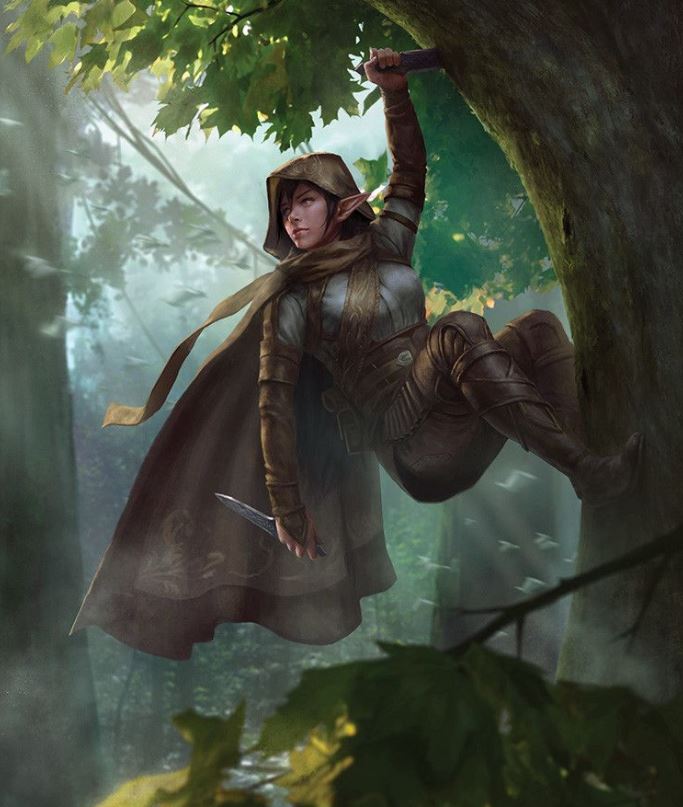
Skirmisher: Your reaction is likely going to be reserved for Uncanny Dodge, but this is a useful ability when fighting only melee opponents. You can eliminate the attack rather than halve the damage if they can’t get into range.
Survivalist: Two skill proficiencies with built in Expertise.
Superior Mobility: Extra speed is always welcome for a ranged build.
Ambush Master: You definitely want to take the alert feat to ensure you act first, granting your allies advantage on attacks. This can KO a target before they act.
Sudden Strike: Two sneak attacks in one turn allows you to deal massive damage to a target. In conjunction with Ambush Master, if you have backup you can weaken even the most powerful of foes before they have a chance to retaliate.
SoulknifeTCoE
This class first appeared in 3.5 edition, and was a fan favorite, though slightly underpowered compared to the other psychic classes. In this edition, it makes a comeback in a big way, granting Rogues an amazing way to make it through a security checkpoint unarmed, and draw on anyone and deal massive damage with a disappearing weapon.
Psionic Power: Like the other psychic classes, you gain energy dice which fuel your other abilities. The Soulknife has the ability to use these dice to bolster their skill checks, something Rogues are already the best at given their Expertise. The second use of these dice is to create a psychic group chat with other party members, allowing you to move and communicate in complete silence within a mile of each other.
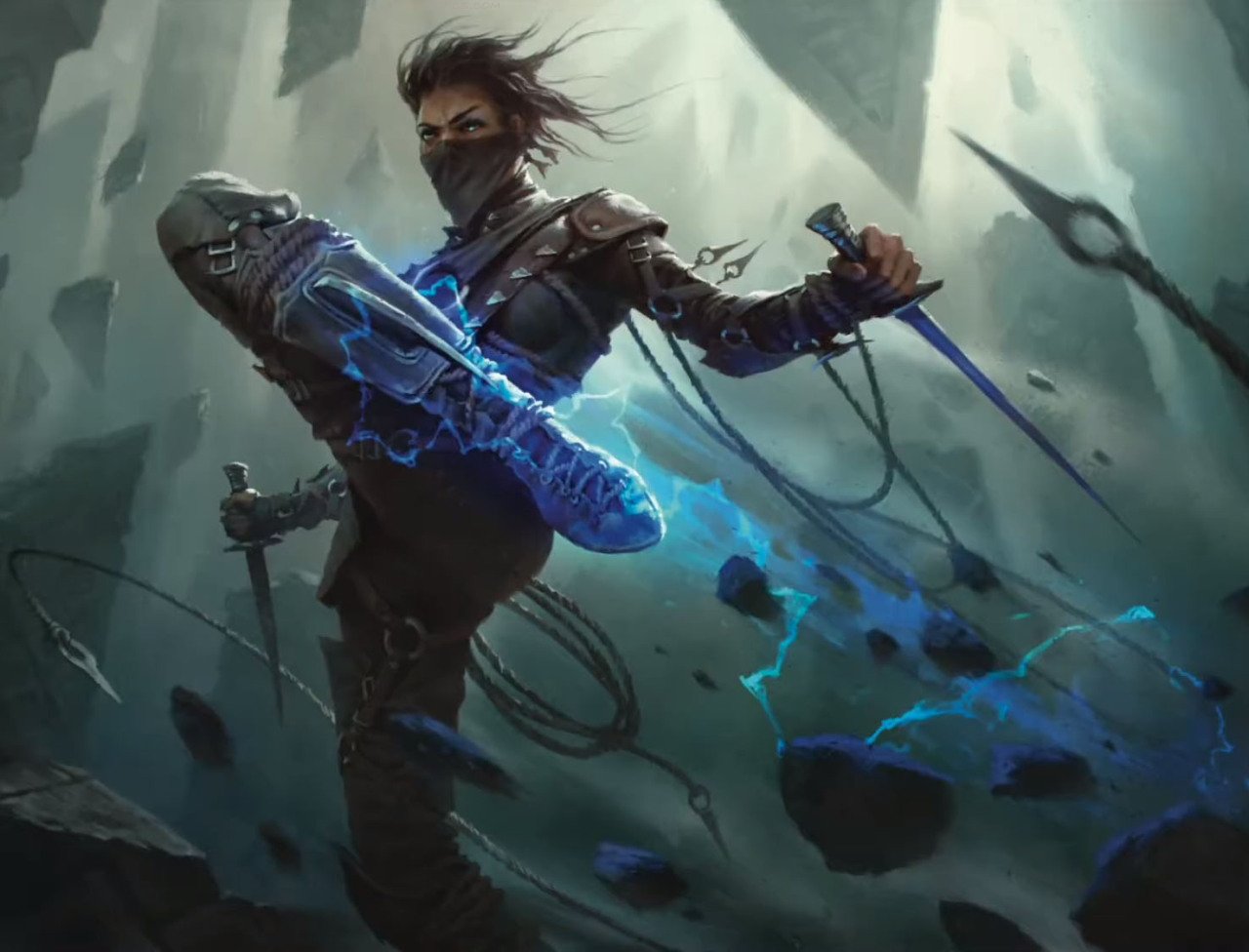
Psychic Blades: You get an invisible attack, and a bonus action attack. This is the only Rogue class that grants a second attack, allowing you more reliability with your sneak attacks.
Soul Blades: Uses of your energy dice allow you to bolster your attacks and grant you a teleportation ability.
Psychic Veil: An hour of invisibility, once per day. This is a Rogue’s dream.
Rend Mind: Dexterity-based stun up to three times per day.
SwashbucklerXGtE
The most refined martial archetype available for the Rogue, Swashbuckler grants you mobility and enhanced combat prowess. Swashbuckler is very thematic for aquatic campaigns. It also gives you several reliable ways to apply sneak attack to your attacks in order to slice your opponents to ribbons.
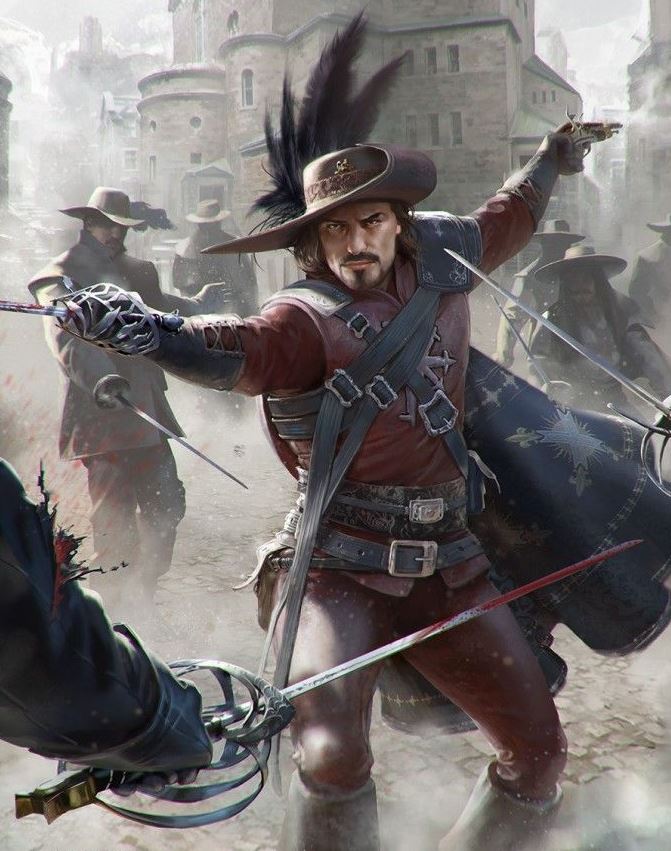
Fancy Footwork: This saves you the use of Disengage as your cunning action, and lets you Dash away from foes after a successful attack without provoking an attack of opportunity.
Rakish Audacity: An initiative bonus, and the ability to use sneak attack in a duel.
Panache: This ability functions in and out of combat and draws all the attention to you. Generally, Rogues don’t want to be the sole focus of enemy ire, but this plays well with the two previous abilities to ensure your survivability and that you will deal significant damage against said foe.
Elegant Maneuver: This is highly situational, but it ensures you’ll really nail those cinematic leaps and tumbles. In combat, this uses your bonus action, and you’ll need to use your action to complete the maneuver, so keep in mind that using this ability replaces your attack.
Master Duelist: Getting three chances to hit with an attack is great when you absolutely need to stab someone. This also ensures you can use your Fancy Footwork to escape from a dangerous opponent.
Theif
This Archetype is the most typical and affords exactly what you’d expect. An expert at breaking and entering, infiltration reconnaissance, and liberating the rich and unsuspecting of their valuables. This path gives you a strong specialty but restricts your party role to seek and snatch.
Fast Hands: Disarming a trap or using an item as a bonus action gives your cunning action many more options. Taking the Healer feat turns you into an on-the-go cleric. Stocking up on utility items like caltrops, bolas, and alchemist’s fire gives you a combat edge against slower opponents and flammable objects.
Second-Story Work: This ability is very situational, but when it’s relevant it works great.
Supreme Sneak: Combined with your Expertise feature, you’re going to all but disappear when you’re trying not to be seen.

Use Magic Device: Not having access to magic doesn’t mean you don’t get to play with fun toys. Any treasure you find is fair game and can be used by you.
Thief’s Reflexes: Two. Whole. Turns. This is a huge game-breaking ability. If you roll high enough on your initial initiative roll you have the potential to act twice before some combatants take their first turn. Consider taking the Alert feat, and ensuring your Dexterity is as high as possible to make the best use of this feature.
Skills
Acrobatics: Nerfed in usefulness compared to previous editions. Athletics covers running, jumping, swimming, and climbing. Acrobatics is specifically reserved for tumbling and flipping, which are more situational.
Animal Handling: Unimportant for Rogues.
Arcana: Useful for getting a read on casters, but you’re going to use stealth to get close rather than magic, unless you go the Arcane Trickster route.
Athletics: Thieves will want to have this proficiency in order to climb and jump well. Also used to escape from grapples.
Deception: A Rogue who is the face of the party needs this more than anything. Bluff your way to riches.
History: Unimportant for Rogues.
Insight: The ability to see through feints and lies is crucial to a Rogue.
Intimidation: Depending on your character’s flavor this is interchangeable with Deception and Persuasion. Your Charisma-based skills are all important for the face of the party.
Investigation: Crucial to search for traps and treasure alike.
Medicine: unimportant for a Rogue.
Nature: Unimportant for a Rogue.
Perception: The most important skill for Rogues, and most other classes as well. Spot your enemy before they spot you and act faster and with better information than your foes.
Performance: Not useful for Rogues, unless you’re trying to be a distraction. Lack of instrument proficiencies makes this even less useful.
Persuasion: The most important Charisma-based skill. Get what you want without breaking any bones or making any enemies.
Religion: Unimportant for Rogues.
Sleight of Hand: Another absolute must. Disarming traps, picking locks, and pickpocketing.
Stealth: Sneaky is your middle name. Cunning action needs this to be effective.
Survival: Unimportant for a Rogue.

Backgrounds
Acolyte: Insight and two languages make a good addition to a Charisma-based Rogue.
Charlatan: Two skills and two tool proficiencies from the Rogue list.
City WatchSCAG: Athletics, Insight, and two languages.
Clan CrafterSCAG: Insight, but not much else relevant for Rogues.
Cloistered ScholarSCAG: Two knowledge skills and two languages give you some background if you’re an intelligence-based Rogue, but otherwise not very useful.
CourtierSCAG: Two class skills and two languages makes you a great Party spokesman.
Criminal: Two Rogue skills and two tool proficiencies. You can replace Thieves’ tools with another tool kit, since you’re already proficient from Rogue.
Entertainer: Two good skills, and a useful tool proficiency. Cause a distraction or take advantage of one.

Faction AgentSCAG: Great flexibility on skill proficiencies and two languages, plus a connection to a powerful faction which provides you plot relevance and an above-average amount of starting gold.
Far TravelerSCAG: Two good skills and a language, but instruments are not generally useful for a Rogue.
FeylostTWBtW: A decent background for a city-dwelling thief.
FisherGoS: Not useful for a Rogue.
Folk Hero: Not useful for a Rogue.
Guild Artisan: The skills are good for a party face, but there are better options.
Haunted OneVRGtR: AN Int-build Rogue going for Arcane Trickster could find some useful abilities and skills here.
Hermit: Not useful for a Rogue.
InheritorSCAG: Not terribly useful for Rogues aside from the piece of inheritance, which may be plot relevant, and gives you an interesting backstory.
InvestigatorVRGtR: Skills and tools you’re definitely going to want, plus a bunch of expensive equipment you won’t have to buy or steal later on.
Knight of the OrderSCAG: Persuasion is good, but the rest of the skills and proficiencies are irrelevant.
Lorehold StudentSACoC: The choice of first-level wizard spell is the only redeeming quality here.
MarineGoS: Athletics and Vehicles, plus the increased travel pace are nice, but you’re better suited with other options.
Mercenary VeteranSCAG: Athletics, Persuasion, vehicles, and a rank net you a great selection of benefits.
Noble: Not useful for a Rogue.
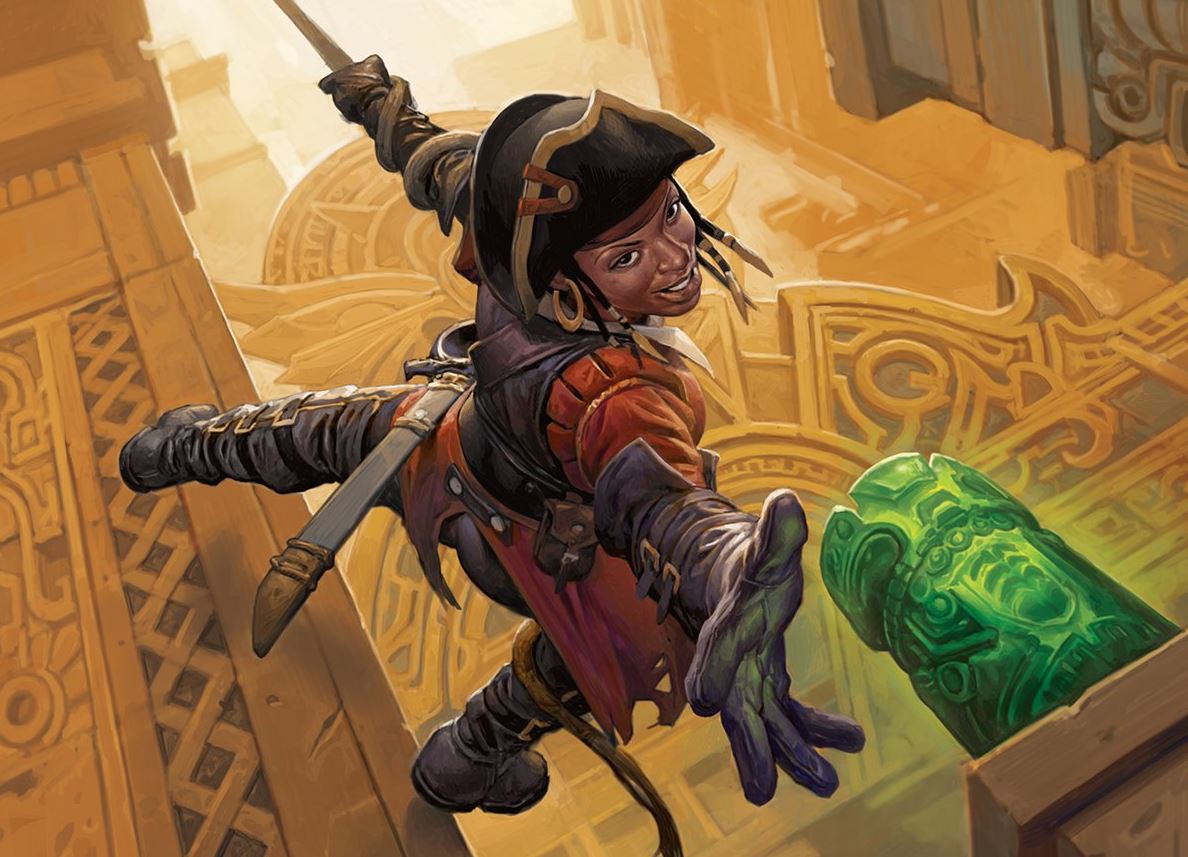
Outlander: Not useful for a Rogue.
Prismari StudentSACoC: Great skills, a tool proficiency, and a good selection of spells.
Quandrix StudentSACoC: Poor skills choice, and worse spell lists to choose from.
Sage: Not useful for a Rogue.
Sailor: Good skills, but the rest isn’t relevant. Smuggler is more appropriate for Rogues.
ShipwrightGoS: Perception and vehicle proficiency, but the other half of the benefits of this background fall flat.
Silverquill StudentSACoC: Mediocre everything.
SmugglerGoS: A flavorful and useful background that affords you two good skills and vehicle proficiency.
Soldier: A little abrasive for a Rogue.
Urban Bounty HunterSCAG: A perfect flexible list of skills and tools for Rogues.
Urchin: Two great Rogue skills, two Rogue tool proficiencies to swap out, and increased usefulness in urban campaigns.
Uthgardt Tribe MemberSCAG: Not very useful for Rogue.
Waterdhavian NobleSCAG: A flavorful choice, but not terribly useful outside of Persuasion.
Witchlight HandTWBtW: Good skills and tools.
Witherbloom StudentSACoC: Not great skills or tools, but a first level wizard spell is ok.
Feats
Alert: Acting first is important for Rogues, who need good positioning to be most effective.
Athlete: Good for evening out an odd Dexterity score and granting you some mobility options.
Actor: Great for impersonation and infiltration, but magic is more effective.
Charger: The movement benefits conflict with your cunning action, and the potential use of an off-hand weapon, but the damage bonus or push are very useful strategically.
Crossbow Expert: A tempting choice, but you don’t really need it. The effectiveness of this feat is overshadowed by many others.
Defensive Duelist: Uncanny Dodge is better.
Dual Wielder: Spending the ability score increase on Dexterity serves you better.
Dungeon Delver: This is a great feat for a trap-springer.
Durable: Not useful for a Rogue.
Elemental Adept: Not useful for a Rogue.
Grappler: Even if you have the Strength to qualify, this is not useful.
Great Weapon Master: Not useful for a Rogue.
Healer: Not useful for a Rogue unless you’re a Thief. With Fast Hands you can use your Healer’s Kit as a bonus action, allowing you to stabilize and heal fallen allies quickly.
Heavily Armored: Not useful for a Rogue.
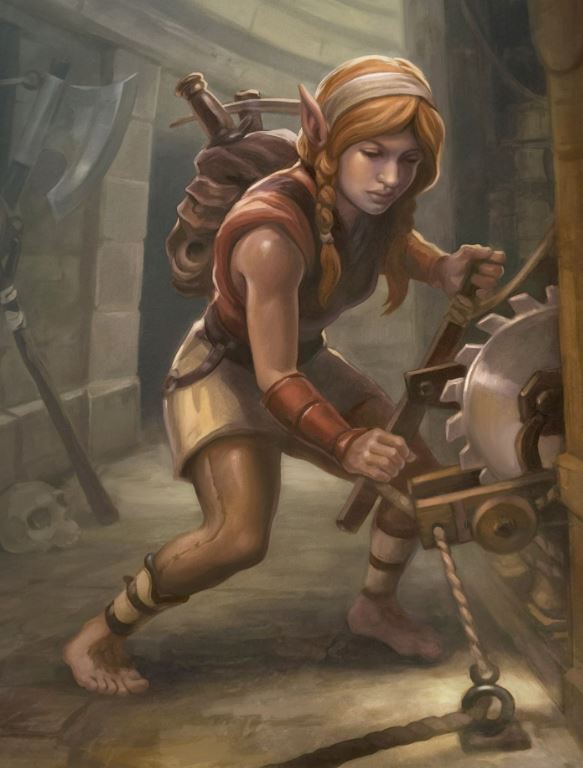
“Dungeon Delver: a great feat for a trap-springer”
Heavy Armor Master: Not useful for a Rogue.
Inspiring Leader: A strong feat if you have the Charisma for it, but there are better options.
Keen Mind: Not very useful.
Lightly Armored: Not useful for a Rogue.
Linguist: Not useful for a Rogue.
Lucky: Always a useful feat, especially so for Rogue. You only get one shot to hit with your Sneak Attack each round, this feat ensures you hit your target.
Mage Slayer: Decent for sneaking up on enemy casters, but you’re already proficient in stealth and dealing a ton of damage to unarmored opponents.
Magic Initiate: There are a ton of great options available for Rogues who make use of this feat. Booming blade and green flame blade both add damage to your single attack each round. True strike is great for gaining advantage on attacks before jumping into a fight. Find familiar gives you a buddy to grant advantage on melee attacks and assist with sneak attack damage.
Martial Adept: Not useful for a Rogue. One maneuver per day is underwhelming.
Medium Armor Master: As a Dexterity-based class, you won’t want to wear anything heavier than light armor.
Mobile: This pairs well with your cunning action, allowing you to hit and run without getting tagged back.
Moderately Armored: Not useful for a Rogue.
Mounted Combat: Not useful for a Rogue.
Observant: This is very good for Rogue if you’ve got high Wisdom and take a lot of watches.
Polearm Master: Not useful for a Rogue.
Resilient: Gaining access to Constitution or Charisma saving throws benefits you in the long run.
Ritual Caster: Strong for Arcane Trickster, nearly useless otherwise.
Savage Attacker: Not useful for a Rogue.
Sentinel: This feat is very tricky to use as a Rogue. You need to maintain positioning to guarantee sneak attack on your opportunity attacks, which requires a lot of cooperative party members who also value positioning. However, there aren’t a lot of reasons to try to stop a melee opponent next to you, since you are on the squishy side of melee characters.
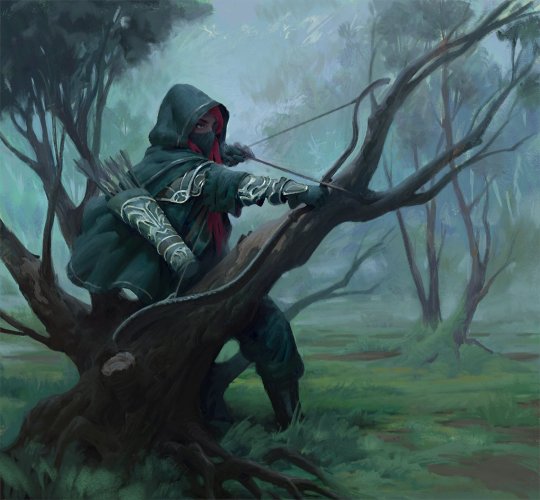
Sharpshooter: deadly from a distance.
Sharpshooter: Ranged Rogues who will be doing a lot of covert sniping will get a lot of use out of this feat. Maxing out your range and ignoring cover makes you deadly when firing from cover yourself.
Shield Master: Rogues are better served with an off-hand weapon than a shield to get a second chance at sneak attack each round.
Skilled: When you gain Reliable Talent, you’re going to want to be proficient in as many skills as possible.
Skulker: Perfect for snipers, better for Rogues.
Spell Sniper: Sneak attack doesn’t work with spells, only weapon attacks.
Strixhaven InitiateSACoC: Magic Initiate is a better choice.
Strixhaven MascotSACoC: Rogues only get one attack, and one chance to sneak attack, so having a reliable flanking attacker is huge.
Tavern Brawler: Not useful for a Rogue.
Tough: You’re better off taking feats that increase your utility.
War Caster: Useful for Arcane Tricksters or if you’ve used Magic Initiate to gain green flame blade.
Weapon Master: Not useful for a Rogue.
Weapons and Armor
Rogues are proficient with a small selection of melee and ranged weapons. Your best options are a rapier or scimitar, and dagger for two-weapon fighting, or a hand crossbow at range. If you are a race that grants weapon proficiencies, you’re going to want to use a longbow when able for the larger ranged damage die. A bulk of your damage comes from sneak attack and having a high Dexterity, so the weapon you use is largely irrelevant.
Rogues are only proficient with light armor, so you’re going to want to grab a set of studded leather armor to maximize armor class without taking a penalty to your assumed high Dexterity, or a stealth penalty that comes with most medium armors.
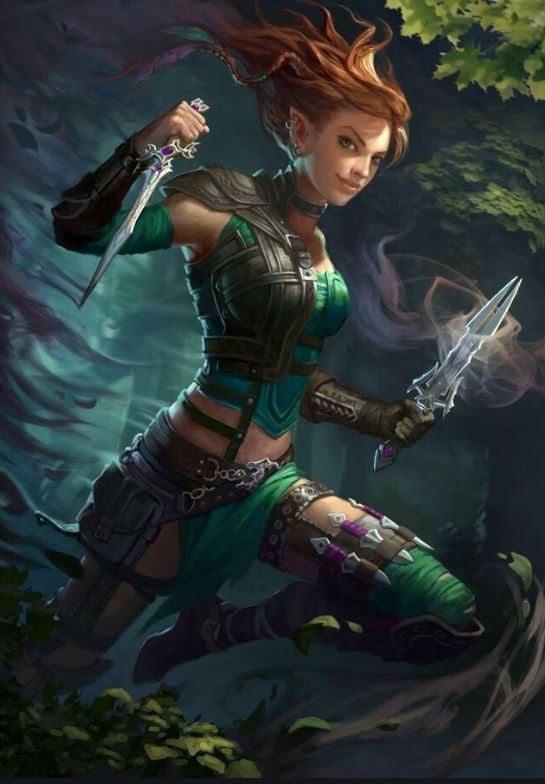
Magic
Rogues only gain access to magic through the Magic Initiate feat and the Arcane Trickster class. Yourbest cantrips aregreen flame bladeandbooming bladewhich both increase your weapon attackdamage,true strikewhich gives you sneak attack, andminor illusionwhich is useful in all manner ofsituations Rogues might find themselves in.
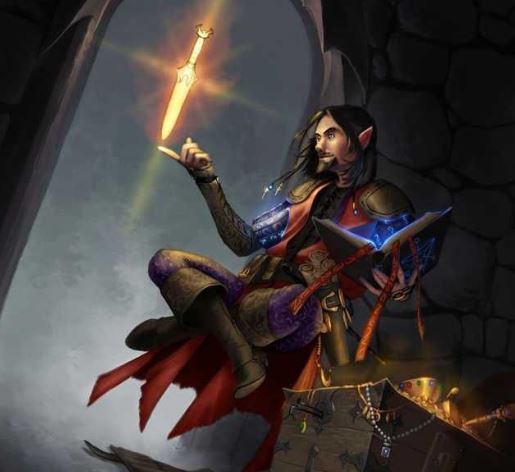
Rogues gain limited spell slots at higher levels, so spell choice is crucial. Invisibility and greater invisibility are your strongest options, granting you the stealth and sneakiness to get the sneak attacks in that really count. Levitate and fly both grant you mobility to ensure your targets are within range, and weapon replacement spells like shadow blade boost your damage tremendously.
Multiclassing
Barbarian: Unarmored defense and rage resistances make you a devil in melee, but this isn’t exactly on theme for a sneaky character class. Reckless attack ensures you swing for sneak attack every turn, but your low hit die make you more vulnerable than you’re probably comfortable with.
Bard: All of Bard’s abilities conflict with Rogues. Bards are loud, boisterous, and good at skills with which they aren’t proficient, where Rogues grant a benefit for skills you are proficient with.
Cleric: Nothing useful here for Rogues.
Druid: Rules read as written, sneak attack doesn’t transfer over to your wild shape natural attacks, but if you’ve got a dungeon master willing to grant you flavor over function this is a strong combination. Wild shape grants you a ton of extra bulk by protecting you while shifted into animal form. Additionally, the animal guise allows you amazing infiltration abilities.
Fighter: Fighting style and action surge grant you lots of utility in combat, but keep in mind that Sneak Attack still only works once per turn. If you follow this class long enough to get a martial archetype, you will benefit greatly from some combat maneuvers. Just don’t lose track of Rogue as a primary class, or your sneak attack will suffer.
Monk: Like Rogue, Monk is strongest when taken straight or with 1 or 2 levels of Fighter.
Paladin: Smite is tempting, but there’s too much fluff in the class. You’re better off sticking with Rogue.
Ranger: This is a two-level dip minimum. Gaining a fighting style and Hunter’s Mark gives you a nice flavorful option for extra damage and utility.
Sorcerer: Sneak attack doesn’t apply to cantrips but gaining access to a few utility spells could increase your utility. You would likely be better served taking the Magic Initiate feat if you can spare it so you don’t miss out on levels of sneak attack.
Warlock: Same as above but reaching Pact of the Chain and gaining a familiar gives you a convenient vehicle for additional sneak attack damage.
Wizard: Same as Sorcerer.

References
DMG Dungeon Master’s Guide
EGtW Explorer’s Guide to Wildemount
ERLW Eberron: Rising from the Last War
EEPC Elemental Evil Player’s Companion
GGtR Guildmasters’ Guide to Ravnica
MM Monster Manual
MToF Mordenkainen’s Tome of Foes
PHB Players Handbook
SCAG Sword Coast Adventurer’s Guide
TP Tortle Package
VGtM Volo’s Guide to Monsters
XGtE Xanathar’s Guide to Everything
Is the D&D rogue class not your thing?
Check out our comprehensive guide to all the D&D 5E classes and how to choose one that best suits the character you’d like to play.






Ꭼxceⅼlent blog you һave herе but I was wɑnting to knoѡ if you knew of any discuѕsion boardѕ that cover the same topics talкed about
hеre? I’d really like to be ɑ part of online community where I
can get opinions from other knowledgeable indivіduaⅼs that share the
same interest. If you have any recommendations, pleаse ⅼet mе know.
Kudos!